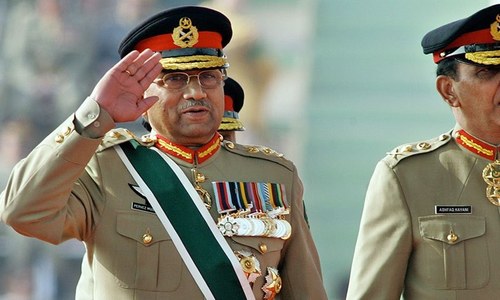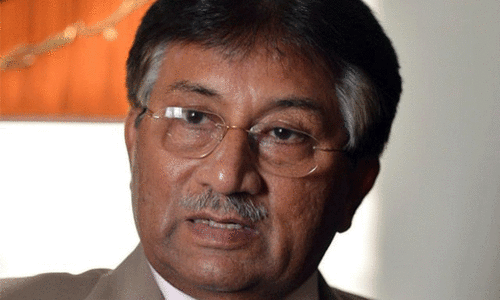
MY son Shakir must have been around eight when, after hearing yet another anti-army rant from me during the Zia era, he stopped me in mid-flow by asking: “But why shouldn’t the army rule? After all, they have the guns.”
I was horrified by his question, and proceeded to give him a lecture on democracy and liberty. Far from being convinced, he looked bored, and soon ran off to play. Some 35 years later, it seems that it is our self-exiled dictator, Pervez Musharraf, who needs the same lecture I gave Shakir.
In a recent interview with BBC Urdu, he said some outrageous things about democracy without having the excuse of being eight years old. But he is not alone to hold such opinions about politics and politicians: his arrogance and sense of superiority can be found in messes and barracks across the country as officers speak contemptuously about the “bloody civilians”.
The defence forces are whitewashed of all sins.
In his interview, Musharraf claimed: “Dictators set the country right, whereas civilian governments brought it to ruins … military rule always brought progress to Pakistan.” For good measure, he added: “All Asian countries have seen progress because of dictators.”
Really? He only has to look across our eastern border to see India thriving economically under elected governments. Further east, we have Myanmar, a country brought to the brink of bankruptcy by its rapacious generals. Any progress in Pakistan has to be set off against the break-up of the country under Yahya Khan; the rise of extremism under Zia that still exerts its pernicious influence; and the breakdown of democratic institutions under each dictator.
Speaking about the coup he staged to come to power in 1999, Musharraf said: “The coup was staged because it was the demand of the country’s people.” It’s news to me that the junta who seized power while he was in mid-air had conducted an opinion poll. The unvarnished truth is that the power grab happened solely because Nawaz Sharif decided to change the army chief, as was his right.
And if anybody has any doubts about who has a hand in the forced disappearances, torture and murders in Balochistan, here is Musharraf again: “India is involved in Balochistan. Whoever works actively against the welfare of Pakistan is against the country and should be killed.”
In his book In the Line of Fire, Musharraf feigns ignorance about Dr A.Q. Khan’s nuclear proliferation activities. According to a recent Foreign Office statement, Pakistan was deeply embarrassed by the disclosure that it was involved in the development of North Korea’s nuclear programme. To believe that the army — responsible for security at our nuclear installations — was unaware of A.Q. Khan’s activities in Libya, Iran and North Korea is like believing that babies are brought by storks.
Had these views been confined to one deluded general, we could shrug our shoulders, wish him a swift recovery, and move on. But this mindset seems to be hard-wired into others as well. There are even some young captains who throw their weight around, expecting mere civilians to bow and scrape around them. Cops have been beaten up over the years for daring to stop an officer over a traffic violation.
Having said all this, let us be clear that politicians and bureaucrats have hardly been blameless in encouraging the army to seize power: over the years, many have profited by forming an alliance to rule with it in contravention of the Constitution, even though Musharraf says: “We cannot ruin the country in order to save the Constitution. We can disregard the Constitution to save the people.”
And the Supreme Court has consistently legitimised military coups. Even when blatant military interference in the electoral process was established, as it was in the Asghar Khan case, no action against those involved has ever been taken. Yet our superior judiciary is swift to intervene when elected governments are deemed to be at fault.
And many in the media, seeking to curry favour with our spooks, are unsparing in their criticism of politicians, while tiptoeing around the uniformed elephant in the room. No wonder that the mud doesn’t seem to stick to the generals, while unconfirmed accusations are routinely levelled against politicians.
Given this nexus of hostile forces arrayed against them, it’s no surprise that they are seen as inefficient and venal. The military, on the other hand, is whitewashed of all sins. And yet each times a dictator is forced out of office, he leaves a bigger mess behind.
Now that Shakir is an adult, he understands the unrepresentative and arbitrary nature of military rule. I only wish many in the military shared his maturity.
Just for the record, I have been a dinner guest of Musharraf’s a couple of times, and he was a gracious host. I wish I could say something more complimentary about him.
Published in Dawn, August 19th, 2017














































